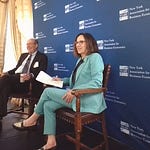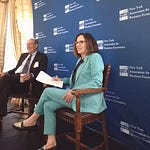David G. Blanchflower, aka Danny is fired up when it comes to where the Bank of England is now and what’s going to be driving it next. As expected the BOE did not cut its key rate this week but it’s a move Danny thinks is inevitably on its way. He sees the 0.1% drop in the UK’s January GDP report, which came out just before the BOE voted to hold its key rate steady, as a portent of more weakness in the economy to come. And a sign that the Labour government - which eight months ago won its first election in 14 years, unseating the Conservative party - hasn’t “the slightest clue what to do to get the economy going.”
In fact while wages are still growing and inflation above target, he expects they will move lower as growth slows, giving the BOE more room to cut rates again.
Danny notes that he was on the BOE’s Monetary Policy Committee from 2006 to 2009 “as we watched the economy tank.” He blames tight fiscal policy for keeping growth flat. And expects that if the current government to pursue another round of austerity “rates will come down, perhaps faster than the market thinks.”
We covered a lot of ground. How Brexit has made the country more vulnerable, held down GDP and living standards. How President Trump has pushed Britain towards Europe. Why the BOE must be prepared for shocks that could overturn markets as has recently happened in the U.K.
In addition, Danny shared one of his passions which will be the subject of a UN conference at Dartmouth he is helping to put together for October of this year: growth in youth mental illness. He says this is a disability that prevents too many from making the transition from school to work, thereby lowering the productivity of the economies where they reside.
So dive in and hear what he has to say, with an energy, enthusiasm, and unabashedness for which he is so well known.
UK Spending cuts are coming 00:01:39.800
You're right. The committee didn't really do anything, but when you read through the minutes and read through what they're saying, they're clearly sitting on tenterhooks thinking, well, there's stuff coming, and we better be ready. The shock in a way they had the last couple of days is they had GDP data, which was slightly negative for January. The big deal in the data, in a way, obviously sitting, thinking, well, what's happening on the tariff front on April second, what's going to happen? Is the Uk going to be part of that? What's the Chancellor going to do? Because, unlike in the United States, all the revenues come to the Treasury, it's like the King's treasury and the Chancellor, the Exchequer then decides what taxes will be, and how spending will be made. Well, the talk is that spending cuts are coming.
BOE grids for trouble ahead 00:02:54.890
Tough times are coming! We've still got an inflation shock. The labour market doesn't look too bad, but a sea of troubles are probably coming our way, and I think that's how I see it.
High real wages but no policy strategy 00:03:48.050
I think it's running on empty. I mean, I think that's the story. The government has sort of pushed itself, saying we need to get growth, and they're clearly not seeing growth. I mean, it's sort of trundling along. There is some evidence that real wage growth is relatively high. But I say, I think there is no real sign of a growth strategy. There's no real sign that the Government has the slightest clue what to do to get the economy going.
Lower rates ahead! 00:04:34.670
During the great recession, I was on the bank committee from 2006 through 2009, as we watched the economy tank. But I think the story that was relevant after that was that for a decade rates remained very flat. And why was that? And the reason was that fiscal policy was very tight. The only show in town was the central bank. and there was nowhere else to go. So, my suspicion is that rates will have to fall, and if, as we see what the likelihood of what's coming, there's quite another round of austerity coming, rates will come down, perhaps faster than the market thinks… and <they> may have to sit there, because otherwise we're I mean, there's potentially an inflation burst. But if the economy starts to slow that will pull inflation down.
Brexit still hurts 00:05:48.880
Brexit has made the country more vulnerable, it seems to me, and it's impacted living standards. It's held down. GDP, it's held down living standards. What's interesting, I think, in the 3 months or so since Trump's been in office, it's pushed the Uk. Much closer to Europe.
Trump has unified Europe 00:06:11.346
The conversations between Macron and Starmer and other European leaders has sort of meant a gelling together, and the opinions of the British people are now strongly against Brexit, so I think the vulnerability of Brexit and the lowering of the living standards sits alongside what's happened in the United States where we both are… where, in a sense, Trump has pushed Britain towards Europe. And has pushed Canada towards Europe. And <pushed> Australia, towards Europe. And so those forces all have to go on. But I think the big deal is. how are these tariffs going to hit? Is the Uk going to be able to sort of sneak out of it. We're not really clear. I mean Trump's talk to Starmer. Maybe it's a possibility that Starmer will be able to say, well, the Uk is not part of that. If they become part of it. Maybe the thing to do is to get back in with Europe, because there's talk about European collective action.
Labour-not as expected 00:09:27.560
Well, obviously, we talked a little bit about the international headwinds. You know what's happening in Ukraine, what's happening on tariffs. Those are all very relevant. It's the 1st Labor government that's come in and basically got in on a landslide in opposition to the austerity. And people felt incompetence of the previous government, and I think people sort of felt that this Government was going to come in with more of a social conscience, more of a social contract, perhaps. and I think, and I supported. I wrote letters saying I thought it was a good thing, but coming, I thought that the previous government had kind of lost its way and then they came in, and the 1st thing they did was they cut how they cut heating allowances to old, poor old people
The first big mis-step 00:11:20.990
As your first step, especially as we have 6 or 7 million people still on wait list in the NHS (National Health Service). There's lots of social problems.. We're going to talk a little bit, I think in a minute about a giant mental health problem amongst the young. So your first action as a Chancellor really is to go after unemployment benefits, disability benefits and heating for old people.
Huge mental health issues 00:13:17.770The story that I'm really sort of puzzled by is that what we're seeing is, there's been a huge rise in disability of young people. A huge rise in people who came out of university basically had mental health issues didn't make that transition from school to work aren't out doing productive things which lowers the productivity of the economy going forward. And now what you're going to do is you're going to say, well, we'll cut back on spending on those people. And so we're going to get, I mean, where's the incentives here? It's just very heartless. And so what? And what? I've been working on a great deal around the world is. There's been a collapse in the well-being of the young, academic performance been impacted.
Of surprises and scenarios 00:23:34.600
We're concerned that a surprise is going to come, and a surprise could be well, I gave you the Liz Truss thing <UK Prime Minister, Leader of Conservative Party September to October 2022> and it took three hours for the economy to collapse. And so you had to be ready. Who was ready? Bank of England was ready, and I think they will be mindful that surprises might come as a really bad set of data. The market falls, the bond markets start to move the foreign exchange markets start to move, and they will start to think, What should we do? And they basically <do> what they should be doing. And they actually said it in these minutes, which is interesting. They're coming out with a report. They do quarterly reports, and there's a word in there for people which I thought was quite telling. There's a word in there where they're not really moving in the world of forecasting. They're moving to the world of scenarios.
It depends… 00:24:30.120
If the tariffs are 10, we think this, if they're 4, we think this, if they're one. We think that if this country so they're in the world where they're having to sort of come up with scenario, which is sensible, right? But it's not like saying, well, what are you going to do? Because they're going to, more than ever say, well, it depends.
David Graham Blanchflower is the Bruce V. Rauner '78 Professor of Economics at Dartmouth College. In 1973 he received his B.A. Soc. Sci. (Economics) at the University of Leicester, 1975 his Postgraduate Certificate in Education at the University of Birmingham, 1981 his M.Sc. (Econ) at the University of Wales, 1985 his Ph.D. at the University of London and 1996 his M.A. (Honorary) at Dartmouth College. He received an honorary D.Litt degree in 2007 from his alma mater, the University of Leicester and an honorary D.Sc. degree from Queen Mary, University of London in July 2009.
From 1984 until 1986 he worked as Research Officer at the Institute for Employment Research at University of Warwick and from 1986 until 1989 as a Lecturer at the Department of Economics at University of Surrey, UK.
His current research interests are: Trade Unions, Entrepreneurship, Wage Determination; Youth Unemployment and Labour Market Responses to the Financial Crisis.
He has published in numerous refereed journals and has been a member of the Editorial Board of Small Business Economics, of the Editorial Board of Scottish Journal of Political Economy and of the Editorial Board of Industrial & Labor Relations Review (1996-1999).
He is also a Research Associate at the National Bureau of Economic Research and CESifo. He was a member of the Monetary Policy Committee at the Bank of England from 2006-2009.
David Blanchflower joined IZA as a Research Fellow in October 1999. He acted as Program Director of the "Future of Labor" research program at IZA from 2009-2016.













Share this post